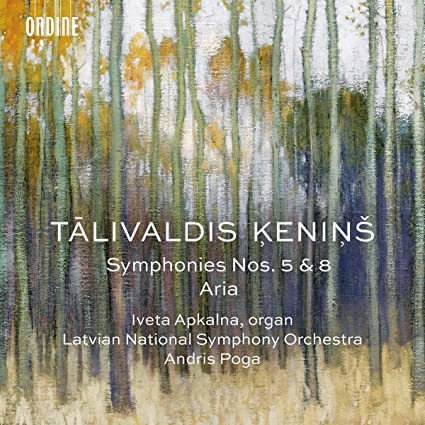
ESSENTIAL RECORDINGS

Symphony No. 5 (1976) Symphony No. 8 "Sinfonia concertata" for organ and orchestra (1986) Arie per corde (1984)
This is the third instalment in the ongoing Ondine recording project with the Latvian National Symphony Orchestra conducted by Andris Poga, covering all the symphonies by Latvian Canadian composer Tālivaldis Ķeniņš (1919-2008). His output consists of eight symphonies, twelve concertos, and many works for choir, piano and organ. In 1951, after moving to Canada, he became organist at the Latvian Lutheran St Andrews church in Toronto, and shortly after began teaching at the University of Toronto, where he remained for 32 years. The booklet notes point out that he's been described as a "contemporary romantic" and a "conservative modernist". These may sound like one and the same and interchangeable, but I would lean more towards the latter. The generally dark undercurrents in his music speak of the romantic influence, but his structural layout and harmonic language are clearly indicative of a late 20th century composer.
The opening movement of the Symphony No. 5 is a highly agitated affair marked by brilliant orchestration touches wherein various percussion instruments are part and parcel of the orchestral fabric. Throughout the whole symphony as a matter of fact, Tālivaldis Ķeniņš masterfully combines all of the instruments of the orchestra in such a way as to create a massive organic, living entity. Rather than sounding prefabricated or using a "paint by numbers" approach like so many modern composers, his writing always comes across as inspired, vibrant, organic, as if the music is feeding on itself to fuel its development.
The fact that Ķeniņš was an organist for most of his life may explain why a composer would even consider writing a symphonic work for organ and orchestra in 1986. The Symphony No. 8 "Sinfonia concertata" for organ and orchestra was dedicated to Canadian organist Patrick Wedd, who was a student of Ķeniņš during the 1960s. In this new, and what appears to be world premiere recording, the organ part is performed by Iveta Apkalna, considered one of the leading instrumentalists in the world. Since her debut together with the Berlin Philharmonic under the baton of Claudio Abbado in 2007, she has performed with a number of the world's top orchestras. In this work, again marked by an extensive use of various percussion instruments, the organ's main role is to be an integral part of the orchestral fabric, something that Ķeniņš once again conveys in a highly organic fashion. Especially during the expressive middle Chorale movement, these orchestration qualities come to the forefront, where any and all instruments become extensions of the pipe organ, and everything comes together in a beautifully attained resolution at the end. The percussion instrument players once again take centre stage in the upbeat Toccata finale, in which Ķeniņš whips the organ and orchestra into a frenzy, only to let everything die away quietly in the end.
I should have hitched myself to this Ondine symphonic cycle right from the start, but I somehow seem to have overlooked the initial two recordings. Based on how impressed I've been with this recording, that is something I plan on rectifying as soon as possible. If you've been on the lookout for fascinating 20th century composers to discover and follow, add Tālivaldis Ķeniņš to your list.
Jean-Yves Duperron - February 2022